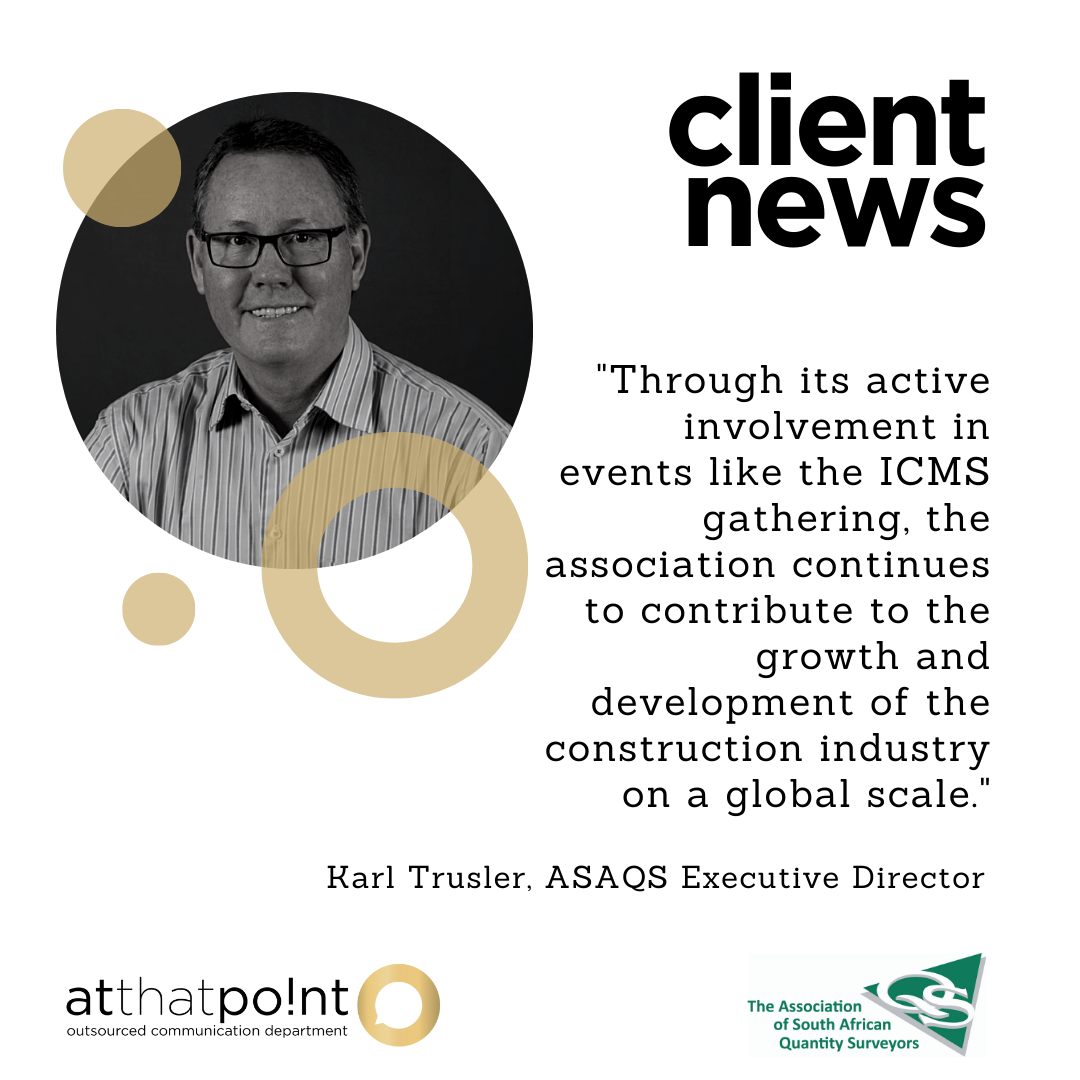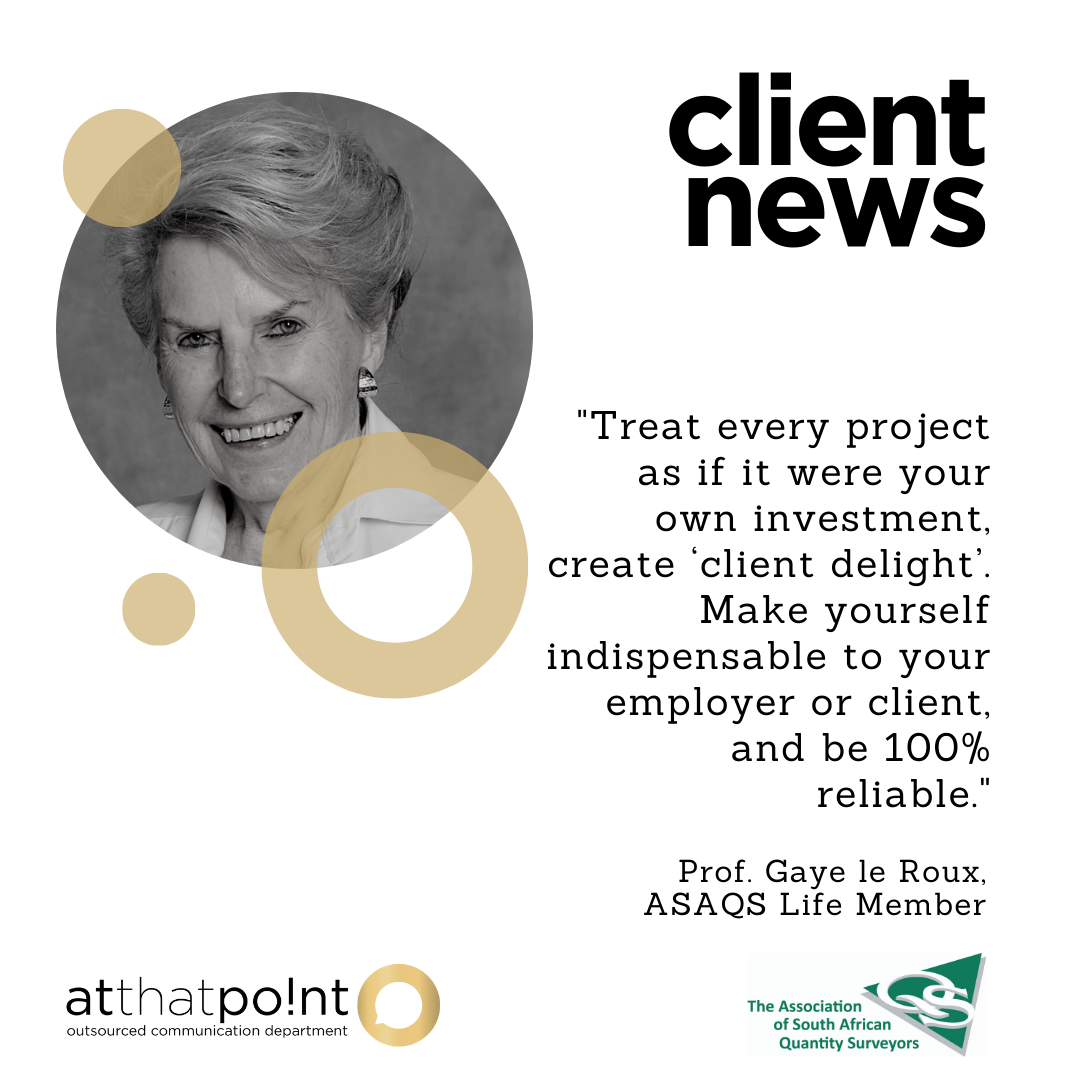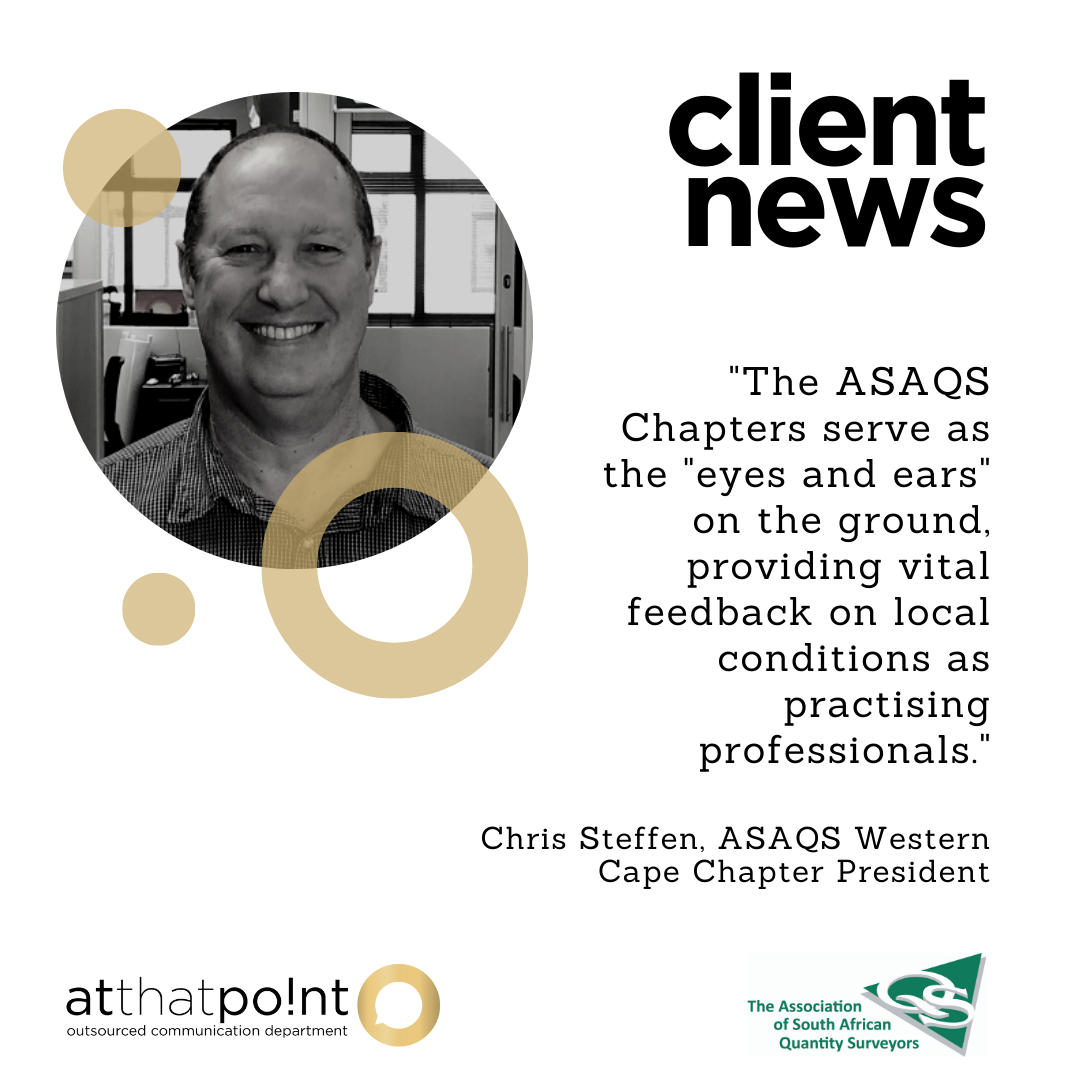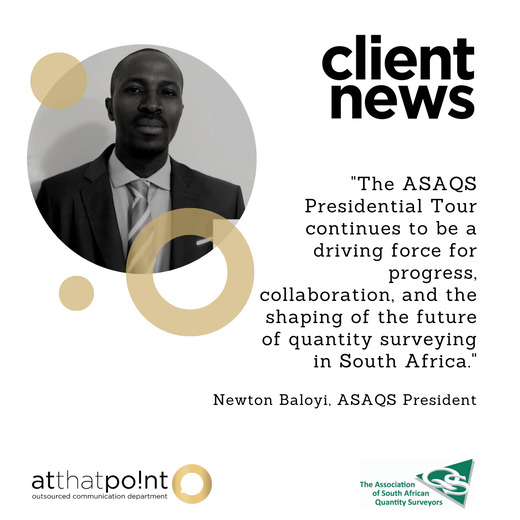|
ASAQS' newly elected president, Mosha Senyolo, may describe her appointment as “a surprise” - but for those around her, it was nothing but expected.
After all, Senyolo has been shattering glass ceilings for years - and the fact that she is the first black woman to be chosen as president of ASAQS is one of many firsts she has achieved in her career. “Becoming the first black woman president of such a globally respected organisation was never something I aimed for personally,” Senyolo notes. “However, I am tremendously honoured and filled with gratitude. This achievement stands as a testament to the dedication, unwavering commitment, and deep passion I have for our profession.” A new perspective on an established legacy In 2021, she was appointed as junior vice president at ASAQS, and says that role provided her with invaluable insights and preparation for the presidency. “I had the opportunity to closely observe the responsibilities of senior leadership within our organisation. I also gained a deep understanding of the ASAQS operations, challenges, and strategic direction.” She cites collaborating closely with her predecessors - Keith Skinner and Newton Baloyi - as instrumental to her effective leadership and decision-making skills. “Serving as junior vice president taught me the importance of humility, listening to diverse perspectives, and making decisions that prioritise the collective good of our members and the built environment as a whole.” As president, she hopes to build on the ASAQS legacy while also making some necessary changes. “With my tenure, I aim to prioritise turning innovative ideas into tangible, measurable achievements which will be built on the strong foundation laid by past presidents,” she explains. “I intend to focus on enhancing member engagement and satisfaction through tailored programs and communication strategies.” She would also like to see opportunities to expand the association's influence both locally and internationally, ensuring the ASAQS remains at the forefront of industry standards and advocacy. “Ultimately, my goal is to foster a culture of continuous improvement, where every initiative contributes to our collective success and the advancement of our profession.” Patriotism at the heart of her dedication to QS Senyolo says though the challenges are not to be taken lightly, she is excited about the future of Quantity Surveying in South Africa. “Beyond traditional cost estimation and management roles, Quantity Surveyors are increasingly recognised for our ability to provide strategic insights and mitigate risks on behalf of clients, thereby maximising returns on investment for diverse stakeholders.” She acknowledges that it takes a lot of time and commitment to serve on the ASAQS board, and says the simple reason for her dedication is “patriotism” - a value which drives her in her personal and professional life. “My first inspiration was my father, Mr. Thabo Senyolo, who has been noted by the School of Construction, Economics and Management at Wits University to be the first black-qualified Quantity Surveyor. Patriotism, in my lived experience, embodies a belief in something greater than oneself. I draw inspiration from fellow South Africans who zealously represent both their professions and our nation. “South Africa has achieved much to be proud of—our advancements and global influence are testament to this. The ASAQS epitomises these enduring values, navigating challenges with resilience. It is our collective duty to uphold this legacy, placing the common good above individual interests.” ENDS MEDIA CONTACT: Stephné du Toit, [email protected], 084 587 9933, www.atthatpoint.co.za For more information on ASAQS please visit: Website: www.asaqs.co.za LinkedIn: linkedin.com/company/asaqs X: @the_ASAQS Facebook: facebook.com/asaqsza
0 Comments
Ofentse Pitse views barriers not as hurdles, but as challenges. That is probably one of the reasons she keeps breaking them.
As the first black South African woman to conduct and own an all-black orchestra, the 31-year-old has become a beacon of hope and inspiration for aspiring artists from diverse backgrounds. Ofentse is however not only a remarkable and influential figure in the world of music - she’s also a Candidate Architect, infusing her musical interpretations with the precision and creativity of her background in the built environment. “As a teenager, I used to love watching Top Billing on TV,” she recalls, referring to the popular South African lifestyle television programme that aired on the national broadcaster. “They would always feature a magnificent house, and the presenter would do a walkabout with the architect of the residence. I started dreaming of designing homes myself.” Harmonizing Arts: The Connection Between Music and Architecture She entered the Wits University Architecture Department in 2012 to pursue her degree, which she then followed with an honours program and a master's - of which she recently submitted her thesis. All of this was accomplished while also actively pursuing a musical career. Earlier this year, Netflix released a music video of an instrumental version of one of the songs used in the series Queen Charlotte: A Bridgerton Story. The song “If I Ain't Got You” is performed by the superstar Alicia Keys in the video with a 74-piece worldwide orchestra made up solely of women of colour. The conductor of this ensemble is none other than Ofentse. She acknowledges that balancing music and architecture is difficult. “Music demands of you to analyze scores; you need a deep understanding of its intricate dynamics. It's quite time-consuming,” she explains. “And then the architecture requires research, to be well versed with the context and the concepts.” Because Ofentse has to spend hours in the studio or at rehearsals for her music, it would be challenging to work a "nine to five" job in architecture. “Fortunately, I currently have the option of working as a freelance architect, which is fantastic since it keeps the dream alive,” she says, adding that she also firmly believes the two disciplines complement each other. “The architecture background enables me to express myself musically. The very same principles that I was taught in architecture, are the same ones used in music - principles such as technique, balance, structure, harmony,” she explains. “When I analyze a musical score, I always think about those principles that I learned in architecture. "When I'm rehearsing, I picture the musical piece the same way I would design a building. I decide what to view as the ‘habitable’ part of the score. Then I look at what the ‘private areas’ are, then the public areas. Where I would pause in the score, and where I’d move.” She believes the reason why she is physically very dynamic as a conductor is because she puts her architecture training into it. “And that's my secret to success!” A Fusion of Belief, Talent, and Unwavering Effort Her advice to people in the built environment who want to combine their career with creative outlet or passion is to look at the world as a limitless place. “It's an endless canvas, and they should imagine that they're able to just take any colour they feel like on any given day. My family has taught me from a young age that anything is possible, and because I have always believed it, it became my truth.” She does however add that greatness is not only the product of belief and talent. “The other thing that got me here is the fact that I'm a very hard worker,” she explains. “In exploring all these various things, I dedicated myself to wanting to learn.” Ofentse also supports industry associations like ASAQS and always encourages young architects to become members. “The importance of these institutions is that they keep our field regulated and protect us from those who are practising illegitimately and giving the industry a bad name. Being part of an establishment like ASAQS empowers us to actively contribute to elevating the architecture and design domain, ensuring that the standards by which we design and create are always at the highest level.” And the pinnacle of excellence is where Ofentse has already proven herself to perform at her best. With her passion, dedication, and unwavering pursuit of excellence, she continues to craft a musical and architectural legacy that transcends disciplines and touches the hearts of audiences worldwide. ENDS MEDIA CONTACT FOR OFENTSE PITSE: [email protected] MEDIA CONTACT FOR THE ASAQS: Stephné du Toit, [email protected], 084 587 9933, www.atthatpoint.co.za For more information on ASAQS please visit: Website: www.asaqs.co.za LinkedIn: linkedin.com/company/asaqs Twitter: @the_ASAQS Facebook: facebook.com/asaqsza Vuyolwethu Badi, a seasoned Professional Quantity Surveyor with over 16 years of experience in the South African Built Environment, is making a significant impact in the industry. As a Director and Shareholder at RLB, a prominent global cost consultancy firm, her journey to success has been marked by determination, resilience, and a deep-rooted desire to uplift her community.
A Serendipitious Meeting with her Future Career Born and raised in rural Middledrift in the Eastern Cape, Vuyolwethu's upbringing in a conservative family laid the foundation for the person she is today. Her late mother, a teacher, and her father, a former politician and businessman, instilled in her the values of love, discipline, and nurturing. Despite her modest background, Vuyolwethu's drive and curiosity led her on an unexpected path towards quantity surveying. "I first went to a local school, but in Grade 3, I identified Adelaide Gymnasium school as my preferred choice,” she recalls. “I saw the girls from that school in their smart blazers and ties, and I wanted to dress like them. It connected me to the ‘big wide world’.” She then stumbled upon the industry by accident, she explains. “I approached a man who was measuring up the school's hostels for renovations and inquired about his work. That's when I discovered what quantity surveyors do. At that time, I was struggling to decide on a career, and I became convinced that quantity surveying would enable me to give back to my poor community." Vuyolwethu's journey to becoming a registered quantity surveyor involved hard work and perseverance. She completed her BTech degree in 2007 and joined RLB in 2014, where she made an immediate impression with her strong work ethic. By 2016, she had completed all the Professional Skills Modules prescribed by the South African Council for the Quantity Surveying Profession (SACQSP) and became a registered Professional Quantity Surveyor. Remarkably, she achieved her goal of becoming a director at the age of 33, ahead of her initial target of 35. She vividly remembers the early days when she struggled to secure an internship, but her boldness and determination prevailed. "In mid-February of the year I should have started my internship, I was still looking for a job. I walked into the Department of Public Works in Pretoria and asked to speak to someone about the quantity surveyors they worked with. I had to fend for myself without the support networks available to young women today," she shares. Giving back and moving forward Vuyolwethu says her involvement with ASAQS has been instrumental in her career development. Since 2016, she has proudly maintained her professional membership and briefly served on the ASAQS Gauteng Chapter from October 2022 to May 2023. "What I appreciate most about my membership with ASAQS has been the organization's steadfast commitment to providing high-quality, continued professional development training. Through various training modules and webinars, I have had the opportunity to stay abreast of industry trends and gain a deeper understanding of the quantity surveying profession," she affirms. As an experienced quantity surveyor, Vuyolwethu offers valuable advice to youngsters considering a career in the industry. "To truly excel and thrive in this challenging professional landscape, it is essential for youngsters to prioritize professionalism above all else," she asserts. “They should approach every task with focus, integrity, and high standards of work ethics while continuously seeking personal growth through acquiring new skills and expanding their knowledge.” Beyond her professional achievements, Vuyolwethu finds joy in traveling and cherishing moments with her family. “When I'm not engrossed in work, my mind is consumed by planning my next thrilling adventure. Exploring new destinations and creating unforgettable memories is my ultimate passion." With her remarkable achievements and unwavering spirit, Vuyolwethu is paving the way for future generations and leaving an indelible mark on the industry. ENDS MEDIA CONTACT: Stephné du Toit, [email protected], 084 587 9933, www.atthatpoint.co.za For more information on ASAQS please visit: Website: www.asaqs.co.za LinkedIn: linkedin.com/company/asaqs Twitter: @the_ASAQS Facebook: facebook.com/asaqsza Professor Nishani Harinarain, an Associate Professor in the Construction Studies Discipline, has emerged as a trailblazer in the field of construction and an inspiring figure for women in science.
With a career spanning over 17 years in academia (she was the first PhD graduate in Construction Management at UKZN) she has made significant contributions to the construction industry and has garnered several accolades for her outstanding work. "I was drawn to the construction industry because of my fascination with buildings and infrastructure,” she recalls. “I enjoy seeing projects come to life and being involved in the process." ‘Women add unique skills to the industry’ As a woman entering the construction field, Nishani faced numerous challenges, particularly those related to gender bias and stereotypes. "I was often the only woman on site or in the boardroom,” she explains. “I faced scepticism about my abilities, and although I did not encounter it, I know that the industry can be harsh and unwelcoming and, in the past, insensitive towards women." To overcome these challenges, Nishani emphasizes the importance of persistence and hard work. “I ensured that I was never excluded and that I was given the opportunities to grow. I think it is important for firms to create a more inclusive and supportive environment to address the unique challenges faced by women. Maybe this can even help attract and retain more women in the construction industry." When asked about the unique perspectives and skills that women bring to the field of quantity surveying, she highlights their collaborative nature and communication skills. “Our ability to foster strong relationships, facilitate teamwork, and effectively communicate with stakeholders can enhance project coordination and client satisfaction. Women also tend to be adept at building and nurturing relationships, which is crucial in quantity surveying. Developing trust and rapport with clients, contractors, and suppliers can lead to long-term partnerships and repeat business, contributing to the success of projects and the reputation of the quantity surveyor. We play an important role in the industry." Roleplayers should work together to encourage STEM careers Offering advice to young women considering a career in construction or quantity surveying, Nishani encourages them to explore their interests and connect with professionals in the field. “Their experiences and guidance can provide valuable insights and support as you navigate your own career path. Take the time to understand why you are interested in the construction industry or quantity surveying. Explore different aspects of the field to identify what truly resonates with you” To encourage more young girls to consider STEM careers in construction-related fields, Nishani suggests early exposure to STEM concepts and construction-related activities. "Girls need to be encouraged to pursue their interests and passions without societal limitations. There needs to be a collaboration between construction companies, industry associations, and professional organizations to promote diversity and inclusivity that specifically target girls and promote their entry into STEM fields within the construction industry." She believes that a career in quantity surveying is not only rewarding and fulfilling but also contributes to the industry's growth and helps shape a more diverse and inclusive future. *Professor Nishani Harinarain is a member of The Association of South African Quantity Surveyors and has been facilitating numerous webinars through the EduTech arm of the ASAQS. ENDS MEDIA CONTACT: Stephné du Toit, [email protected], 084 587 9933, www.atthatpoint.co.za For more information on ASAQS please visit: Website: www.asaqs.co.za LinkedIn: linkedin.com/company/asaqs Twitter: @the_ASAQS Facebook: facebook.com/asaqsza The Association of South African Quantity Surveyors (ASAQS) was proud to be represented by Karl Trusler, Executive Director of the ASAQS and Secretary General of the ICMS Trustees Coalition, at the recent International Cost Management Standards (ICMS) event held in London. This significant gathering took place from June 15th to June 17th, 2023, at the prestigious Royal Institute of Chartered Surveyors (RICS) offices on Parliament Square, Westminster.
Hosted by RICS and supported by the European Council of Construction Economists (CEEC), the event centered around the theme "Next Steps – Digitising Construction." It provided a platform for industry leaders and experts to exchange insights, discuss future developments, and strengthen international collaborations. The event's itinerary featured a thought-provoking seminar on digitisation in the construction industry, exploring innovative approaches to drive efficiency and productivity. Additionally, the ICMS Trustees Coalition Meeting offered an opportunity for key stakeholders to shape the future direction of cost management standards. The event concluded with the CEEC Annual General Meeting, fostering a sense of unity and cooperation among construction economists from Europe and beyond. Karl Trusler, a respected authority in the field, expressed his gratitude for the productive relationship between ASAQS, RICS, and CEEC. He emphasised the value of collaboration in areas of mutual interest and the exchange of knowledge and resources. This partnership not only benefits the ASAQS members working in the United Kingdom and Europe but also contributes to the growing diaspora of South African quantity surveyors making their mark globally. At the seminar, Trusler delivered a compelling presentation on "ICMS 3 & Future Mapping to National Standards." He showcased how the Elemental Method of Estimating, a familiar local system in South Africa, could be seamlessly integrated with the ICMS 3 coding library. By mapping the Elemental method to the ICMS framework, professionals can confidently prepare accurate Bill of Estimates (BOEs) using the familiar system and easily generate reports in either Elemental or ICMS formats, catering to their clients' specific needs. This approach mitigates the risks associated with implementing entirely new systems and facilitates the smooth transition from the "familiar" to the "new." While the ICMS 3 presents a global standard for reporting on construction life cycle costs and carbon emissions, Trusler acknowledged that not all countries have existing local systems that can be readily mapped to ICMS. In such cases, alternative means, including partnerships, would need to be explored to achieve adoption. The ASAQS is committed to fostering such collaborations to accelerate the worldwide adoption of ICMS 3 as the global standard. The ICMS 3 also provides a comprehensive solution for consistent reporting on carbon emissions, making it an invaluable tool for organisations worldwide committed to pursuing Net Zero targets. It is worth noting that ICMS 3 is freely available for use by all interested parties. To access the ICMS 3 document, please visit the official ICMS Coalition website at https://icms-coalition.org/the-standard/ The ASAQS remains dedicated to advancing the profession of quantity surveying, promoting global best practices, and driving international standards for cost management. Through its active involvement in events like the ICMS gathering, the association continues to contribute to the growth and development of the construction industry on a global scale. ENDS MEDIA CONTACT: Stephné du Toit, [email protected], 084 587 9933, www.atthatpoint.co.za For more information on ASAQS please visit: Website: www.asaqs.co.za LinkedIn: linkedin.com/company/asaqs Twitter: @the_ASAQS Facebook: facebook.com/asaqsza A giant of the industry, Prof. Gaye le Roux (85) an ASAQS Life Member, has recently stepped out of the Eastern Cape Chapter Committee of the ASAQS after almost five decades with the association.
“After 49 years as a Chapter Committee member - from 1974 to earlier this year - I have decided not to make myself available to serve during the new term,” Gaye states. “My pro bono management of townhouse complex maintenance means that I am very seldom free to attend Chapter Committee meetings.” ‘Hard work is not a challenge’ Her absence will certainly be felt by her fellow members. Gaye is after all, frequently referred to in articles as a pioneer, both at ASAQS and elsewhere: In 1987 she was the first woman to have served as the Association of SA Quantity Surveyors' (ASAQS) National President. She then became the first woman worldwide to head up a tertiary Built Environment Department when she took up her appointment as Head of Quantity Surveying at UPE in 1983. She also became the first female recipient of the Association of Schools of Construction of Southern Africa's (ASOCSA) Lifetime Achievement Award in 2016. And yet, her gender is not something she likes to focus on when speaking about her illustrious career in quantity surveying. When asked about any challenges she faced as a woman early on in her career, the answer is simple and straight-forward: “None at all,” she says, and emphasises: “Absolutely no challenges whatsoever. Hard work is not a challenge!” And it quickly becomes clear that this “no nonsense attitude” is intrinsically Gaye. She adds that she believes neither the profession, nor the construction industry are gender-based. “Women should not tolerate being categorised as ‘especially women’,” she advises firmly. “It makes them sound weak. They are there by choice.” Gaye instead suggests that aspiring quantity surveyors never pass up the chance to hear senior colleagues' and industry experts' opinions and perspectives. “Treat every project as if it were your own investment,” she adds. “Create ‘client delight’. Make yourself indispensable to your employer or client. And be 100% reliable.” When describing “client delight” (as opposed to mere ‘client satisfaction) Gaye explains it as follows: “In 1987 I was invited to attend the AGM of the Port Elizabeth Chamber of Commerce, as it was known back then. The Chairman was Mr. Peter Searle, CEO of Volkswagen South Africa. What he said was what I had been trying to verbalise for many years: “Ladies and Gentlemen, the time of mere client satisfaction is past…passé. We must create client delight in every aspect of client service…” And despite creating ‘client delight’ herself over the decades, Gaye got into the industry almost by chance. “Because we wanted to study Maths, I was 1 of 2 girls with 36 boys in the 1955 Matric class at Pearson High School in PE. In September of that year, I was the only kid in that class who had absolutely no idea of any career choice,” she recalls. They were then informed that a QS firm in Port Elizabeth, Warren & Longworth, was looking for Articled Pupils. Gaye recalls that her class teacher was kind, encouraging her: “My girlie, why don’t you talk to them?” he asked. To which Gaye replied: “But Mr Cowley, they only take boys”. Her teacher remained positive, telling her: “You never know…they may take you.” Warren and Longworth indeed admitted her, with 6 years of Articles commencing on 3rd January 1956. “It was mentorship at its very best, and I qualified in 1962 as an ‘external student’ through the long-distance programme offered by the (then) University of Natal,” Gaye says. Goodbye, not Farewell Looking back on her career, she prefers to not highlight any accomplishments as her own. “Every highlight has been the result of support, encouragement, sincere caring and sharing, expert guidance and mentorship that I have been privileged to experience from my earliest years,” she says, referring to her school teachers, colleagues, mentors and wonderful students. “And for 54 years there was the unfailing support of my husband Percy who passed away in July 2019.” Her years serving ASAQS in various positions also hold fond memories. “Often the interaction between the ASAQS President and leaders in other industry-related fields has resulted in improved business relationships, innovative strategies, publication of new documents which have enhanced project and contract management and benefitting from a ‘unity is strength’ approach in dealing with government departments.” Gaye is clearly not someone whose retirement will entail sitting still. “My future plans include carrying on providing pro bono problem-solving answers to queries related to property and projects, submitted by students, professional practitioners and colleagues in construction.” Prof. Gaye le Roux's legacy is one of service, mentorship, and the relentless pursuit of excellence. An ASAQS member whose impact will be felt for generations to come. ENDS MEDIA CONTACT: Stephné du Toit, [email protected], 084 587 9933, www.atthatpoint.co.za For more information on ASAQS please visit: Website: www.asaqs.co.za LinkedIn: linkedin.com/company/asaqs Twitter: @the_ASAQS Facebook: facebook.com/asaqsza The Western Cape Chapter Annual General Meeting and Presidential Tour 2023 successfully concluded despite early season rain and cold weather, which affected attendance on 7 June. The event, led by Chris Steffen, the Western Cape Chapter President, showcased the resilience and determination of the attendees.
The Annual General Meeting commenced with an engaging address from the Executive Director of the ASAQS, Karl Trusler, followed by speeches from the President of the SACQSP, Nosiyabonga Mongane, and the President of the ASAQS, Newton Baloyi. These insightful presentations highlighted the commitment of both organizations to advancing the quantity surveying (QS) profession on a national level and beyond. Participants enjoyed productive networking sessions, enhanced by welcomed refreshments that fostered camaraderie and knowledge exchange. Despite the challenging weather conditions, the event proved to be enriching and left a strong message that the ASAQS and SACQSP are fully committed to demonstrating unwavering local support for the QS profession. The President of the SACQSP, in a heartfelt appeal, called for collective efforts to create a better future. This appeal was met with warmth and appreciation, signaling the unity and shared vision among professionals in the field. Separate meetings the MBA Western Cape, the University of Cape Town, the Cape Peninsula University of Technology, and local practices. Among the areas of discussions included the possibility of developing a guideline for pricing for contractor QS’s; collaboration with academic institutions on research in areas of common interest; developing an objective services and charges guide to curb underpricing of professional fees and disproportionate apportionment of fees across professions; and conducting a survey on the extent of payment delays on professional fees by government in order to reach out to government for resolution of the matter. The occasion underscored the importance of face-to-face meetings, particularly in an era marked by remote work and online interactions. The unique dimension that in-person gatherings offer was evident, emphasizing the significance of effective human connection, goodwill, and progress among fellow professionals and industry partners. The resumption of Presidential Tours, post-COVID, is expected to ignite a revival of the Chapters. These Chapters serve as the "eyes and ears" on the ground, providing vital feedback on local conditions as practising professionals. The ASAQS acknowledges its responsibility to recognize and address these conditions, working towards crafting effective solutions. With the successful conclusion of the Eastern Cape and Western Cape Presidential Tours, we now look ahead with great anticipation to the Northern Cape Chapter, scheduled for 2 and 3 August 2023. About the ASAQS: The Association of South African Quantity Surveyors (ASAQS) is a professional body that represents quantity surveyors in South Africa. ASAQS strives to advance the quantity surveying profession through education, training, and promoting best practices, ensuring the highest standards of professionalism in the industry. For more information, visit www.asaqs.co.za About the SACQSP: The South African Council for the Quantity Surveying Profession (SACQSP) is the regulatory body responsible for promoting and regulating the quantity surveying profession in South Africa. SACQSP aims to protect the public interest by ensuring that quantity surveyors uphold the highest ethical and professional standards. For more information, visit www.sacqsp.org.za ENDS MEDIA CONTACT: Stephné du Toit, [email protected], 084 587 9933, www.atthatpoint.co.za For more information on ASAQS please visit: Website: www.asaqs.co.za LinkedIn: linkedin.com/company/asaqs Twitter: @the_ASAQS Facebook: facebook.com/asaqsza The ASAQS Presidential Tour has made a triumphant return after a three-year hiatus due to the COVID-19 pandemic. This highly anticipated tour brings together quantity surveying professionals from different chapters across South Africa, fostering collaboration and driving advancements within the industry.
Led by ASAQS President Mr. Newton Baloyi and Executive Director Mr. Karl Trusler, the Eastern Cape Chapter Presidential Tour kicked off on May 7, 2023, in Gqebhera. The event, held at the Radisson Blue Hotel, saw the participation of approximately 35 industry experts eager to engage in discussions and shape the future of quantity surveying. The agenda commenced with an impactful Annual General Meeting (AGM) facilitated by Chapter Secretary Janita Stroebel and skillfully led by Chapter Chairperson Siyasanga Loni. The AGM provided a platform for members to share insights, address concerns, and lay the groundwork for advancements in the profession. Distinguished guests, including Mr. Luvuyo Nkwantsha from the Department of Eastern Cape Public Works & Infrastructure and Deputy Executive Mayor Cllr. Mkhuseli Jack, graced the occasion with their presence. Their addresses added valuable perspectives and sparked meaningful conversations among attendees. A highlight of the event was the thought-provoking Q&A session, where participants had the opportunity to seek clarification and delve deeper into the topics discussed. Esteemed Professor Gaye Le Roux contributed her wisdom, enriching the conversation with her fresh insights. Networking played a crucial role, fostering connections and creating a sense of community among attendees. The event concluded on a high note with a delightful meal, allowing participants to further engage in fruitful discussions and forge new collaborations. In addition to the chapter event, the ASAQS President and Executive Director visited Nelson Mandela University, where they addressed aspiring quantity surveying students. Their presence and inspiring words provided encouragement and support as the students embark on their educational journey and prepare for future careers in the field. The resumption of the ASAQS Presidential Tour marks a significant milestone for the quantity surveying profession. It reinforces the value of local chapters in fostering collaboration, addressing shared concerns, and advancing the industry as a whole. This event sets the stage for various outcomes, including strengthening the Eastern Cape Chapter, driving membership growth, establishing a youth program, and forging stronger relationships with key stakeholders such as the Department of Public Works & Infrastructure, the Municipality, and the Master Builders Association. Additionally, research projects initiated through Nelson Mandela University will contribute to the ongoing development of the quantity surveying profession. The ASAQS Presidential Tour continues to be a driving force for progress, collaboration, and the shaping of the future of quantity surveying in South Africa. The industry eagerly awaits the upcoming chapters, anticipating the opportunities they will bring for professionals across the country. ENDS MEDIA CONTACT: Stephné du Toit, [email protected], 084 587 9933, www.atthatpoint.co.za For more information on ASAQS please visit: Website: www.asaqs.co.za LinkedIn: linkedin.com/company/asaqs Twitter: @the_ASAQS Facebook: facebook.com/asaqsza Sitting in her varsity lecturing halls more than three decades ago, Lydia Carroll was one of less than a handful of young women there aiming to become a quantity surveyor. These days, she says, the industry is much more balanced - a good thing, given that she believes it is a “wonderful” career path for women.
Career spanning more than three decades Lydia, a professional quantity surveyor with 36 years of experience, is currently a director in Capital Projects and Infrastructure at PwC Advisory. She has led a number of construction projects throughout her career. She handled construction contract claims and negotiations from both the Employer’s and the Contractor’s perspectives, providing project assurance, serving as a NEC adjudicator, and providing expert testimony in several disputes. She also delivered strategic guidance across multidisciplinary projects. She has worked in the public and private sectors, gaining experience in the industries of power and utilities, paper, oil and gas, mining, infrastructure engineering, water, building, industrial, and recreation. From mentee to mentor Lydia claims that despite being in the minority as a woman when she first entered the field, she hardly ever experienced discrimination. “I grew up with just brothers. So I was never intimidated by men,” she explains. “And I had only been in the industry for a very short time when I began working for Anglo. I mostly performed engineering and mining projects at the time, when it was a completely male-dominated industry. Yet I never felt threatened and men treated me with respect. The only times I did experience some unease was when I had to go down the mines, and some of the more traditionalist men on site were clearly not too comfortable with the idea!” she recalls in good humour. Lydia credits her two mentors, Kevin Spence and the late dr. Corné de Leeuw, as having a big influence on her career success. “I would therefore also advise young women in the profession to make sure they have mentors,” she says. “Find someone that you aspire to be like, and spend time with them. You don’t have to work with them - simply listen to them, learn, and gather wisdom. Your life may be changed by it.” In the same vein, she consistently makes an effort to be accessible to younger quantity surveyors who ask her for guidance. “I believe one should not be afraid to ask. Sometimes the youngsters seem to think they have to be experts right from the start. And if they can’t google it, then they fear there’s something wrong. But you are not supposed to know everything!” She notes that many of her former employees still phone her to ask for advice. “And why not? Rather ask for help, than doing it wrong and putting your client at risk.” ‘Challenges also present opportunities’ Despite the current challenges of loadshedding and the slow pace at which government projects are getting off the ground, Lydia says she is still excited about the future of the quantity surveying industry in South Africa. ”After all, difficulties also present opportunities. Many private industries are now looking at energy alternatives as a result of the electricity crisis. That’s a huge opportunity for somebody in the construction field,” she explains. “So even while I’m not going to pretend everything is sunshine and roses, I do think there are still enough local chances that make this industry an exciting one to be in.” *Lydia Carroll has been both a member and board member of the ASAQS. ENDS MEDIA CONTACT: Stephné du Toit, [email protected], 084 587 9933, www.atthatpoint.co.za For more information on ASAQS please visit: Website: www.asaqs.co.za LinkedIn: linkedin.com/company/asaqs Twitter: @the_ASAQS Facebook: facebook.com/asaqsza The Association of South African Quantity Surveyors (ASAQS) has named Karl Trusler as its new Executive Director (ED), effective from the 1st of September 2022.
Karl has served the Quantity Surveying profession in his capacity as Director of the ASAQS’ training division called EduTech since 2015. He is preceded by Larry Feinberg who immigrated to Israel after fulfilling the ED role at the ASAQS for a decade. “We are grateful to Larry for his leadership, unquestionable commitment to, and passion for the Quantity Surveying profession,” the association said in a recent statement. The long and winding road A registered Professional Quantity Surveyor, Karl started his impressive career in 1987 as a student Quantity Surveyor at Lautenbach & Fairon Quantity Surveyors, in Randburg. From there he took the position of Contractors Quantity Surveyor at Trescon Construction, also a Johannesburg-based firm. It was after this that the property development bug bit hard and Karl decided to open his own business named Karling Construction. After three years of gaining vital experience in the industry, Karl joined van Vuuren, van der Walt and Visser Quantity Surveyors, in Tzaneen, to complete the requirements to register as a professional Quantity Surveyor. Six years later, Karl relocated to Pretoria to study further and work as a pastoral administrator at the Hatfield Christian Church. While working at the church, he studied B.A. Bible and Theology at the International Correspondence Institute in association with Hatfield Training Centre and later took on a part-time position at the Social Housing Foundation until 2010. That same year, Karl was thrilled to start at the University of Pretoria, also in a part-time capacity. Currently, he is a part-time external examiner for MSc Real Estate subjects, and a guest lecturer in Business Management and Financial Management for BSc Real Estate and BSc Quantity Surveying (Honours) courses. In March 2015, Karl finally joined the ASAQS and has never looked back. The lighter side While his professionalism and detailed approach to his role contributed largely to his appointment as the ASAQS’ new ED, we like to know a bit more about who Karl is outside of that and asked a few questions to uncover some fun facts about him: Q: What is the most common misconception about you? Karl: My age Q: What did you care about most when you were 10 years old? Karl: How strong I was Q: Coffee or tea? Karl: Coffee Q: Chocolate or biltong? Karl: Biltong Q: Bushveld or beach? Karl: Beach Q: Summer or winter? Karl: Summer Q: Cats or dogs? Karl: Dogs Hopes for the future Speaking on his aspirations for the profession and the ASAQS going forward, Karl notes that Quantity Surveyors are essential to the built environment because their skill sets are so unique, “In addition to their traditional role, Quantity Surveyors are equipped to apply their skills in a wide range of career options within the industry. This presents an opportunity for widespread influence and leadership,” he adds. Regarding the ASAQS, Karl reiterated the priority to be the “home” of choice for Quantity Surveyors, “We need to demonstrate a sustainable value proposition maintained through continuously listening, observing, interpreting and adapting.” About the ASAQS Inaugurated in 1908, the ASAQS has grown to include quantity surveying professionals active throughout the construction industry in both the private and public sectors. Through its various programmes and activities, the association remains dedicated to advancing and promoting the science and practice of quantity surveying and related matters. Providing a forum for exchanging knowledge and experiences, ASAQS encourages high levels of competence and integrity among its members. ENDS MEDIA CONTACT: Stephné du Toit, [email protected], 084 587 9933, www.atthatpoint.co.za For more information on ASAQS please visit: Website: www.asaqs.co.za LinkedIn: linkedin.com/company/asaqs Twitter: @the_ASAQS Facebook: facebook.com/asaqsza |
Archives
July 2024
Categories
All
|











 RSS Feed
RSS Feed